Journey through ancient texts to discover Gaza's biblical mentions, bridging past narratives with today's geopolitical intricacies.
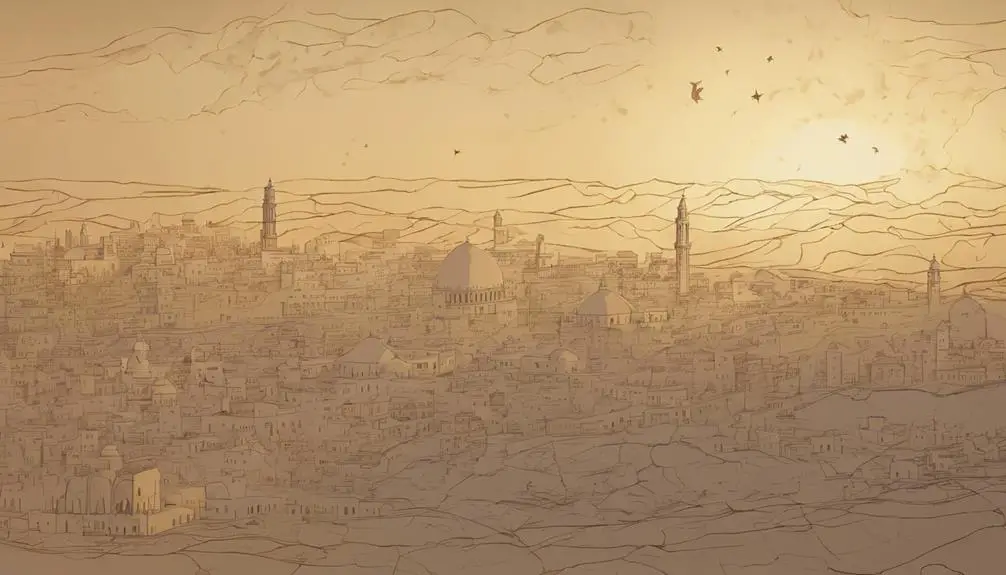
Is Gaza Mentioned in the Bible
In ancient texts and revered scriptures, cities rise and fall, but few have stirred as much curiosity and debate as Gaza. You might ask yourself, is this coastal enclave mentioned in the Bible? The answer could reshape your understanding of historical narratives and spiritual teachings.
As you explore the historical context of Gaza, its presence in the Old Testament, and the key biblical figures associated with it, you'll uncover layers of significance that bridge the past with today's geopolitical landscape.
This journey through ancient texts may offer more questions than answers, compelling you to look closer at what lies beneath the surface.
Key Takeaways
- Gaza is mentioned in the Old Testament, highlighting its military and cultural significance.
- Biblical figure Samson is associated with Gaza, showcasing its historical and spiritual importance.
- Prophecies about Gaza in the Bible reflect its spiritual implications and historical evolution.
- Gaza's role in biblical narratives offers insights into its enduring legacy and spiritual lessons.
Historical Context of Gaza
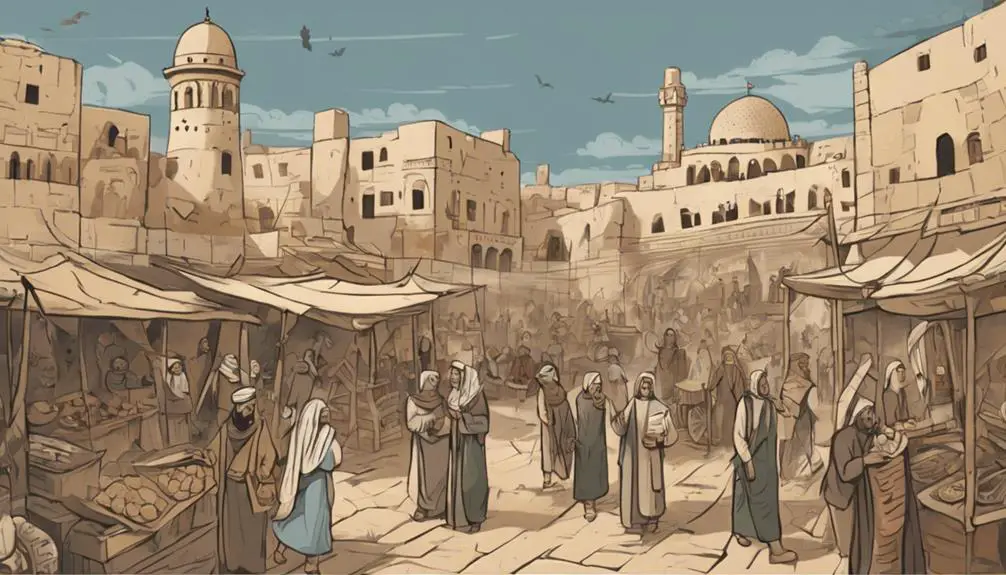
Gaza's history, deeply embedded in the crossroads of civilizations, reveals its significant role in the ancient Near East. Its strategic location, bordered by the Mediterranean Sea to the west and desert to the east, has historically made it a nexus for ancient trade routes connecting Africa, Asia, and Europe. This unique positioning not only facilitated the exchange of goods but also the intermingling of cultures, ideas, and technologies.
You'll find that Gaza's geography played a pivotal role in its prominence throughout history. Situated on the Via Maris, a vital ancient trade route, it served as a gateway for merchants, armies, and travelers between Egypt and the Levant. This advantageous position ensured that Gaza wasn't only a flourishing trade hub but also a coveted prize for empires vying for control over the trade networks.
The city's prosperity in ancient times can largely be attributed to its ability to leverage its geographical assets. Its access to both sea and land routes enabled it to become a melting pot of civilizations, fostering a rich cultural tapestry that has left a lasting legacy on the region. Through its strategic importance, Gaza has etched its mark on the annals of history, demonstrating the profound impact of geography on the development of societies.
Gaza in the Old Testament
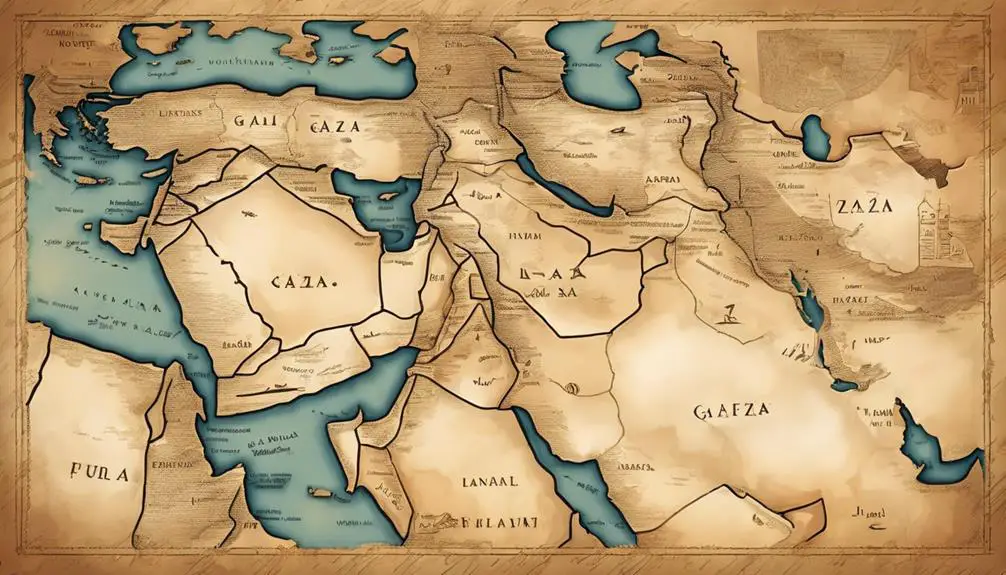
Having explored the geographical and historical significance of Gaza, we now turn our attention to its references within the Old Testament, highlighting its enduring legacy in religious texts. Gaza's geography and its strategic position have made it a focal point of numerous narratives, especially those involving sieges and conflicts.
To keep you engaged, here are three aspects of Gaza's depiction in the Old Testament:
- Strategic Location: Gaza's position as a gateway between Egypt and the Levant is crucial in understanding its frequent mentions. It served as a key battleground and a place of significant confrontations.
- Siege Narratives: The Old Testament recounts several siege narratives involving Gaza. These stories not only reflect its military importance but also serve as metaphors for spiritual and moral lessons.
- Cultural and Religious Intersection: Gaza is depicted as a place where diverse cultures and religions intersect. Its portrayal in the Old Testament reflects the complexities of interactions between the Israelites and their neighbors.
Analyzing Gaza's representation in the Old Testament offers insights into its importance in ancient times, underscoring the intertwining of geography, history, and spirituality.
Key Biblical Figures and Gaza

Several key biblical figures have had significant interactions with Gaza, reflecting its importance in various narrative contexts throughout the Old Testament. One of the most notable is Samson, a figure synonymous with extraordinary strength and his tumultuous encounters with the Philistines. His exploits in Gaza are emblematic of the Philistine conflicts that permeate these ancient texts. You'll find that Samson's final act of bringing down the temple of Dagon, killing himself and many Philistines, occurs in Gaza, highlighting the city's significance as a stage for dramatic narratives of conflict and strength.
The Philistine conflicts, as depicted in the Bible, aren't merely historical or mythological accounts; they serve a deeper narrative purpose. These stories, with Gaza often serving as a backdrop, illustrate the perennial struggle between the Israelites and their neighbors. Samson's strength, while a central theme, also metaphorically represents the struggle of the Israelite people against oppression. Through examining these interactions, you gain insights into the complex socio-political and religious dynamics of the time. Gaza's mention in these contexts underscores its historical and symbolic significance, making it more than just a geographical location but a pivotal element in the unfolding of biblical history.
Gaza's Role in Prophecy
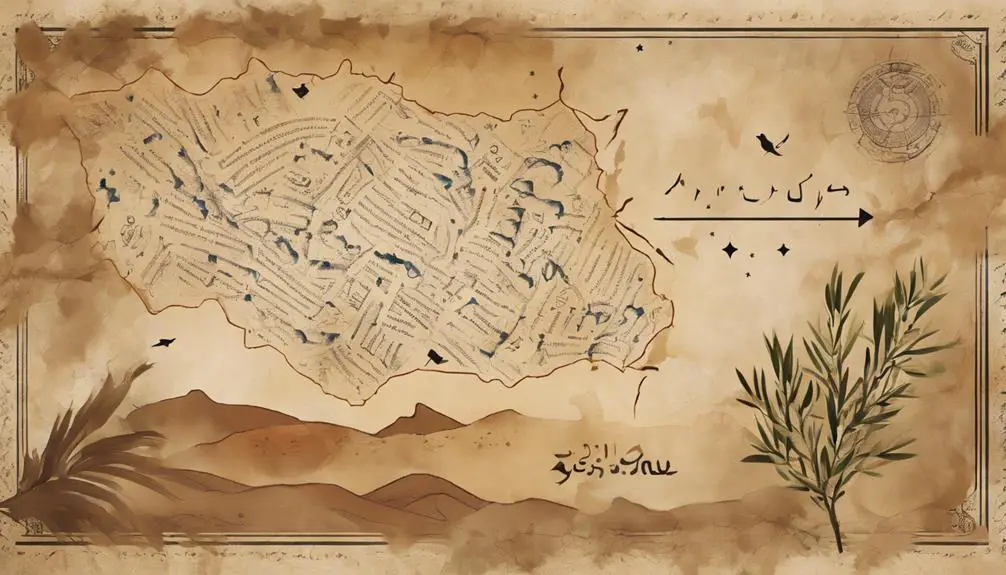
How does Gaza feature in biblical prophecies, and what implications does this have for our understanding of its historical and spiritual significance? As you delve into the texts, it becomes clear that Gaza's mention in prophecy isn't merely historical but carries forward into modern interpretations with significant geopolitical implications.
Here are three key aspects to consider:
- Prophetic Predictions: Ancient texts predict the destruction and subsequent hardships of Gaza. These prophecies, often poetic and metaphorical, have been interpreted through various lenses over centuries, reflecting the tumultuous history of the region.
- Geopolitical Implications: The prophecies concerning Gaza have been analyzed in the context of modern geopolitical events. Scholars debate how these ancient predictions align with or inform contemporary conflicts and resolutions in the Middle East, offering a unique perspective on international relations.
- Spiritual Significance: Beyond geopolitics, the prophecies about Gaza hold deep spiritual lessons. They remind us of the transient nature of political powers and the enduring importance of ethical conduct and justice, serving as moral compasses through time.
Understanding Gaza's role in prophecy requires a careful consideration of these aspects, enriching our comprehension of its place in both history and the unfolding of modern events.
Archaeological Findings Related to Gaza
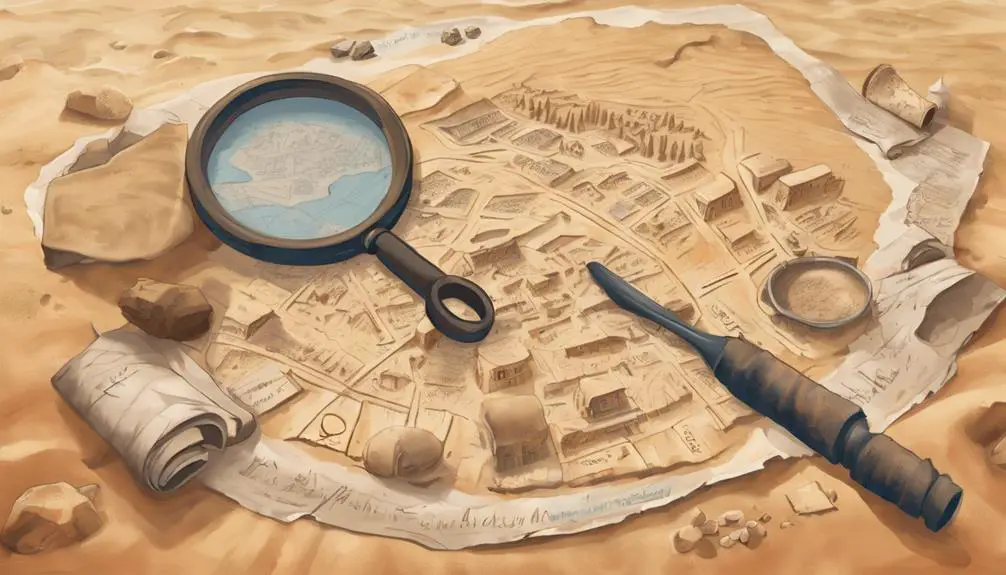
Archaeological excavations in and around Gaza have unearthed artifacts and structures that provide a tangible link to its storied past, shedding light on the region's historical and cultural evolution. These findings, ranging from ancient pottery to remnants of old settlements, underscore Gaza's role as a crucial crossroads of civilizations. The work of archaeologists, meticulously sifting through layers of history, has offered invaluable insights into the daily lives, trade, and warfare of the peoples who once inhabited this area.
Gaza excavations haven't only enriched our understanding of its ancient inhabitants but have also highlighted the challenges of artifact preservation. The delicate balance between uncovering Gaza's historical treasures and ensuring their preservation for future generations is a constant concern for archaeologists and historians alike. Efforts to safeguard these artifacts from environmental threats and human activities are paramount, demonstrating the global importance of Gaza's heritage.
The meticulous documentation and analysis of these archaeological discoveries contribute significantly to the scholarly field, allowing for a more nuanced understanding of Gaza's place in the broader tapestry of human history. Through these efforts, Gaza's ancient legacies continue to inform and inspire, bridging millennia through the tangible remnants of its rich past.
Gaza's Significance Today
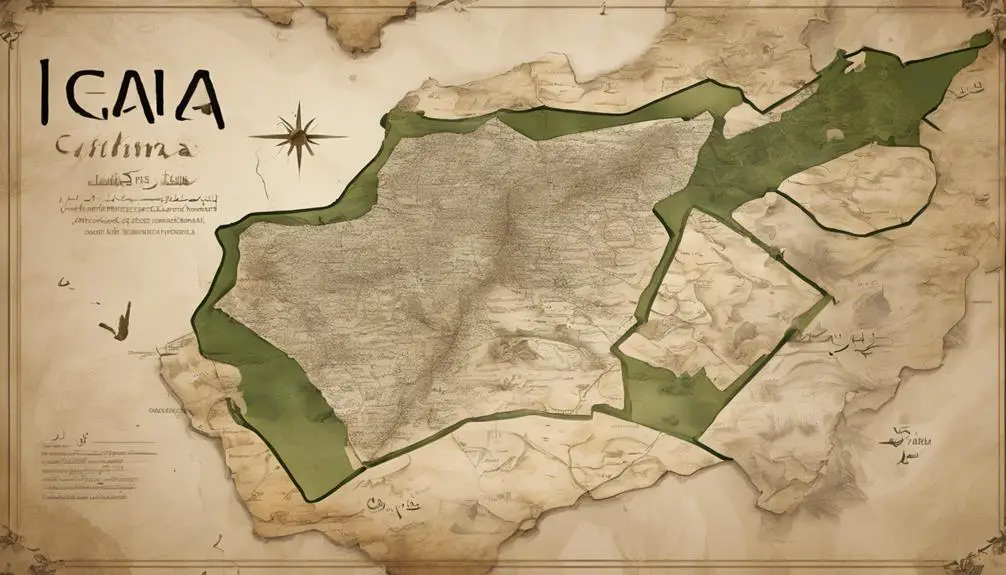
Gaza's contemporary relevance extends beyond its historical legacy, playing a pivotal role in current geopolitical and humanitarian discussions. Today, you'll find that Gaza is a focal point for several critical issues impacting not only the region but also the international community. Here are three key aspects that underscore its significance:
- Economic Challenges: Gaza faces severe economic difficulties, largely due to blockades and restrictions on movement. These challenges have a profound impact on the livelihoods of its inhabitants, contributing to high unemployment rates and limited access to essential resources.
- Humanitarian Conditions: The humanitarian conditions in Gaza are dire, with significant portions of the population relying on aid for basic needs. Access to clean water, healthcare, and education are pressing concerns, exacerbated by frequent conflicts that further strain the already limited resources.
- Geopolitical Importance: Gaza is at the heart of the Israeli-Palestinian conflict, a key issue in Middle Eastern politics. Its strategic location and the ongoing disputes over territory and sovereignty make it a critical point of contention in peace negotiations.
Understanding Gaza's current context requires an examination of these complex layers, where economic struggles and humanitarian crises intersect with deep-seated political conflicts.
Frequently Asked Questions
How Do Modern Interpretations of the Bible Differ in Their View of Gaza Compared to Ancient Texts?
Modern textual analysis of the Bible, when considering Gaza, often emphasizes its historical context more than ancient interpretations did. You'll find scholars applying an analytical, objective lens, highlighting changes in geopolitical landscapes over millennia.
They dissect how ancient narratives around Gaza have evolved in contemporary religious and scholarly discourse. This approach contrasts with older interpretations that might've focused more on theological implications than on the nuanced, scholarly understanding of Gaza's historical significance.
In What Ways Have Contemporary Geopolitical Conflicts Influenced Religious Discussions About Gaza's Biblical Relevance?
Contemporary geopolitical conflicts have woven Gaza into religious discourse like threads through a tapestry. This highlights its historical accuracy and political symbolism. Just as archaeologists unearth layers of history, debates peel back interpretations of Gaza's biblical relevance, scrutinized through the lens of modern strife.
This analytical approach reveals how current tensions shape understanding, emphasizing the intersection of faith and politics. It challenges scholars to navigate the complex terrain of historical context versus contemporary relevance.
Are There Any Lesser-Known Religious Texts Outside of the Bible That Mention Gaza, and How Do They Describe It?
You're diving into the depths of history to find Gaza's mentions outside the Bible. Your quest reveals that Gaza holds a spot in various ancient texts, where its stories blend into mythology.
Archaeological findings support these narratives, piecing together a city much older and culturally richer than many realize. These texts, often overshadowed by biblical references, offer a unique lens on Gaza's historical and mythical significance.
How Has the Perception of Gaza in Religious Tourism Evolved Over the Past Century?
As a mirror reflecting the sands of time, Gaza's tourism landscape has transformed significantly. Over the past century, you've seen Gaza's tourism infrastructure evolve, grappling with modern demands while striving for cultural heritage preservation. This shift mirrors broader socio-political changes, impacting how visitors perceive and engage with the area's rich historical tapestry.
Analyzing this evolution offers insights into the challenges and opportunities facing religious tourism in regions with deep historical roots.
What Role Does Gaza Play in Interfaith Dialogues Between Judaism, Christianity, and Islam Today?
Today, you'll find Gaza at the heart of interfaith initiatives, serving as a unique meeting ground for Judaism, Christianity, and Islam.
Its role in fostering religious coexistence is pivotal, given its rich historical and cultural tapestry. Through dialogues and shared community projects, Gaza is reshaping perceptions and building bridges between these faiths.
Its contributions to peace and understanding are significant, underlining the importance of dialogue in achieving lasting harmony.
Conclusion
As you've journeyed through the historical and biblical landscapes of Gaza, it's clear that this region isn't just a footnote in ancient texts but a vibrant tapestry woven through time. Like a beacon illuminating the past, Gaza's stories, from its mention in the Old Testament to its archaeological revelations, offer a unique lens to view the interplay between divine prophecy and human history.
Understanding Gaza's enduring significance today requires delving into its rich, multifaceted past, a testament to the enduring legacy of sacred narratives in our contemporary world.



Sign up